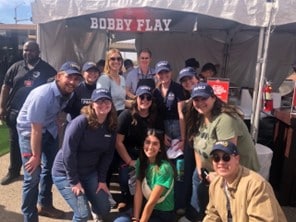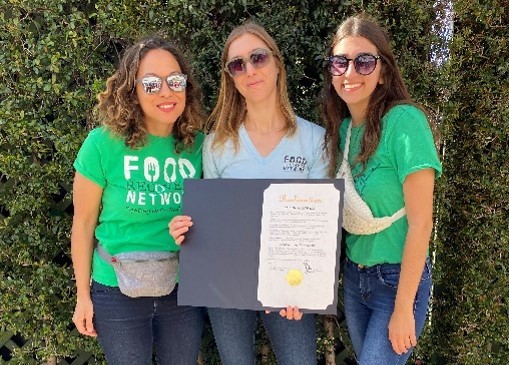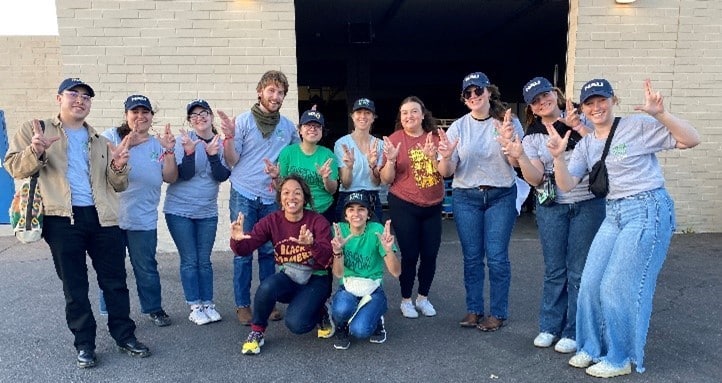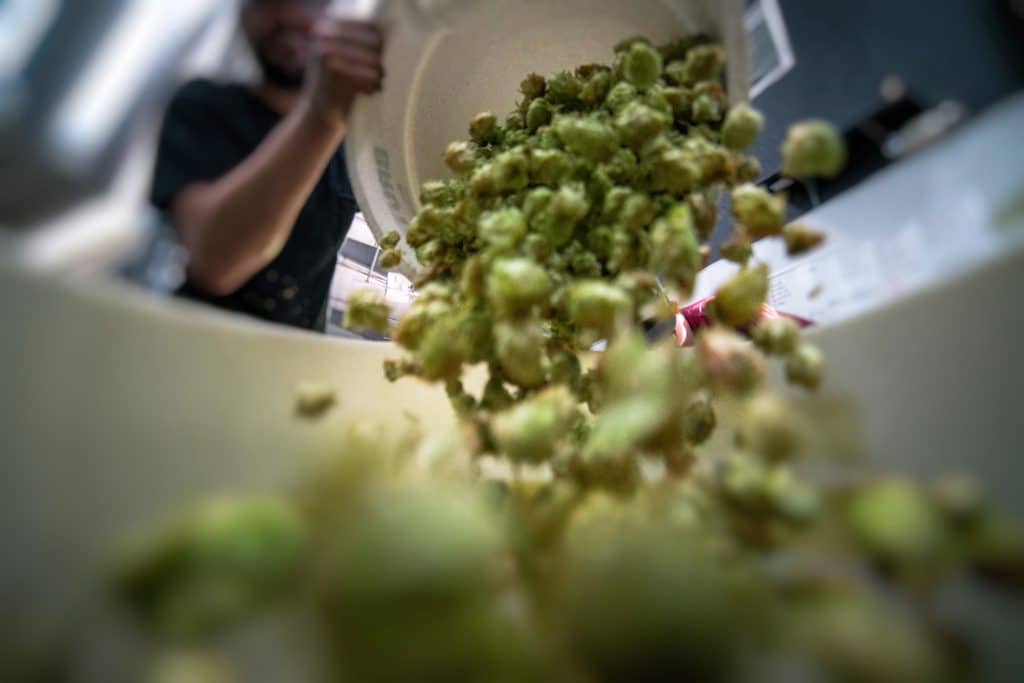
On Feb. 12, while most were tailgating and preparing for the big game, the NAU Food Recovery Network (FRN) traveled to Glendale to recover surplus food from the players’ tailgate. Hosted by celebrity chef Bobby Flay and other top American chefs, the tailgate occurred just before the kickoff. The efforts to prevent food waste on the day that rivals Thanksgiving for food preparation was a tall order. The NAU chapter of FRN began in 2014 and this year, the FRN national invited the NAU chapter to join their considerable task to reduce food waste at the Super Bowl.
Erik Nielsen, NAU’s inaugural chief sustainability officer, believes these programs are essential for the health of the community and world.
“I think the fact that the Superbowl and the city highlighted this issue of food waste is important to raising awareness about the problem of food waste in the US. The upstream environmental demands on water and land for food production are major sources of environmental problems and climate change and so eliminating waste helps to reduce those impacts,” Nielsen said.
During the event, Fran Alvarado, sustainability specialist for NAU Sodexo and student volunteers, enjoyed the tailgate and had the chance to meet Flay. Later in the day, Glendale mayor Jerry Weiers joined the food recovery team to see the work in action and proclaim Feb. 12 as Food Recovery Day.

“It was empowering and impactful to participate in the FRN national food recovery. It was amazing to realize our NAU Chapter played an important role in transporting food to people who need it at Phoenix Rescue Mission,” Alvarado said.
After the event, the food recovery team went behind the scenes and helped with food recovery efforts. There was a refrigerated truck on site to store food for all the chefs, and at the end of the event, every chef and team brought back their leftovers to this truck to be recovered. The NAU Food Recovery team and the national team came together to bring the recovered food to Hope Rescue Mission. At the mission, volunteers separated the food by frozen, produce and dairy, and they were able to redirect 2,901 pounds of food that would have ended up in the landfill if not for their efforts.
The NAU Food Recovery Network’s efforts at the big game and in their community demonstrate how small actions can have a significant impact in reducing food waste and helping those in need. By volunteering or supporting organizations like the NAU Food Recovery Network, everyone can play a role in creating a more sustainable and just food system.

Kiley Feld, NAU food recovery network president and graduate student representative for NAU’s Green Fund, is passionate about the impacts of food on the climate and is interested in plant-based eating, reducing food waste as well as ensuring food access, which led her to restart a Food Recovery Network at NAU with Alvarado to address the issue of edible food being discarded while people in the community go hungry.
“If sustainability initiatives and environmental protection measures are to be effective, students need to be aware and feel that their actions promoting them can make a difference and that they are not alone in this,” Feld said. This is an aspect of student-led initiatives that I think is so important, they build community and solidarity around issues that really matter.”
Food waste is a serious problem in the United States, where an estimated 30-40 percent of the food supply is wasted each year. At the same time, millions of Americans are struggling with hunger and food insecurity. Organizations like the NAU Food Recovery Network help to tackle both problems by recovering surplus food that would otherwise go to waste and distributing it to those in need.
“If we are going to make a significant impact on climate change and make strides toward our carbon neutrality goals, it’s crucial that we ALL get involved. Sodexo as a corporation is also committed to reducing overall food waste by 50% by 2025,” Alvarado said. “It’s especially important that we embrace opportunities to reduce waste and take action in other ways that positively impact or at least lessen our impact on the environment and the community.”
How NAU is tackling waste
The NAU Food Recovery Network is always looking for more volunteers to repurpose food and keep it out of the landfill and help those in the community most in need. They meet every day to recover food at the Hot Spot in the Union and at the DüB that would otherwise be thrown away and take it to the nearby Sunshine Rescue Mission downtown.
“These programs give back to the community and help those serving the most vulnerable in Flagstaff. The environmental benefits of not sending the food to the landfill also reduce our GHG emissions and throwing away something that can feed others,” Nielsen said. “I would love to see organizations, clubs and departments adopt a week or a day for volunteering for NAU food recovery so that this effort becomes more institutionally sustainable.”
The volunteering process is simple and typically takes about an hour or less. For the Hot Spot shifts, volunteers meet at 2 p.m. Monday-Friday (excluding Tuesdays) outside of the Hot Spot in the back by the trucks in groups of two to three (one driver, one or two recovering food). With help from a volunteer shift leader from FRN, volunteers will be walked through the process of food recovery. For the DuB shifts, volunteers meet at 4:50 p.m. Monday-Friday in front of the DuB cafeteria, near the register, in groups of two to three (one driver, one or two recovering food).
“To other students who would like to get involved in sustainability measures, I would say to just take the leap and try it out. Go to a club event, volunteer with a local organization (or FRN!) and see how you feel. Being involved in something that aligns with your values and passions feels good, and it really can make a difference” Feld said. “A few students a day volunteering with FRN has helped us divert 14,000 pounds of food waste and feed hundreds of people! Little actions matter because one: they build on each other and two: they inspire others to act too. This is how social transformations occur; lots of individuals take what steps they can to nurture change.”
If you’re interested in volunteering with the NAU Food Recovery Network, please reach out to the NAU Food Recovery Network chapter at naufoodrecovery@gmail.com.
Cynthia Gerber | NAU Communications
(928) 523-7341 | Cynthia.Gerber@nau.edu




